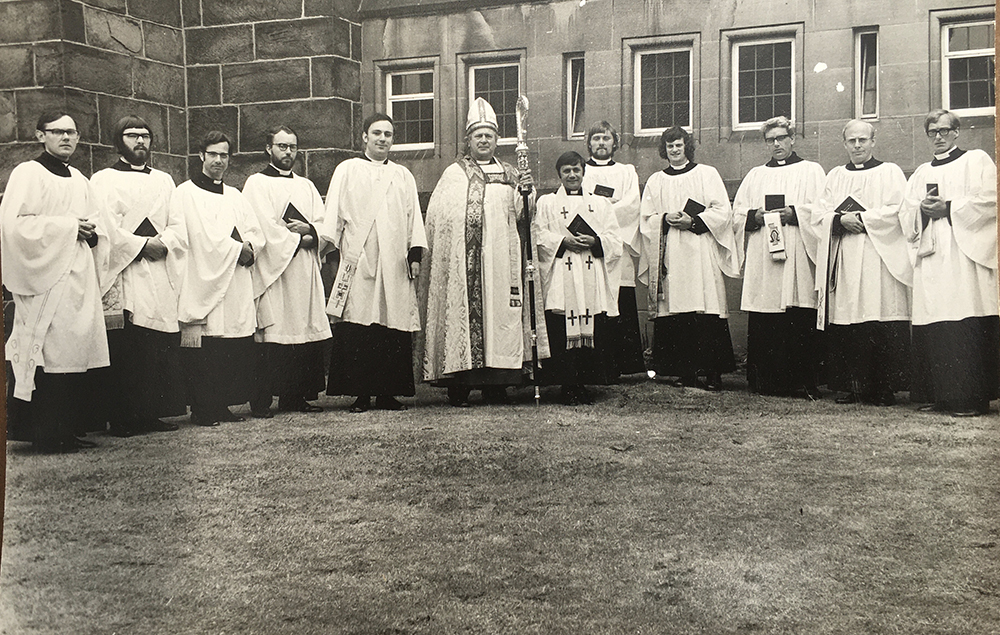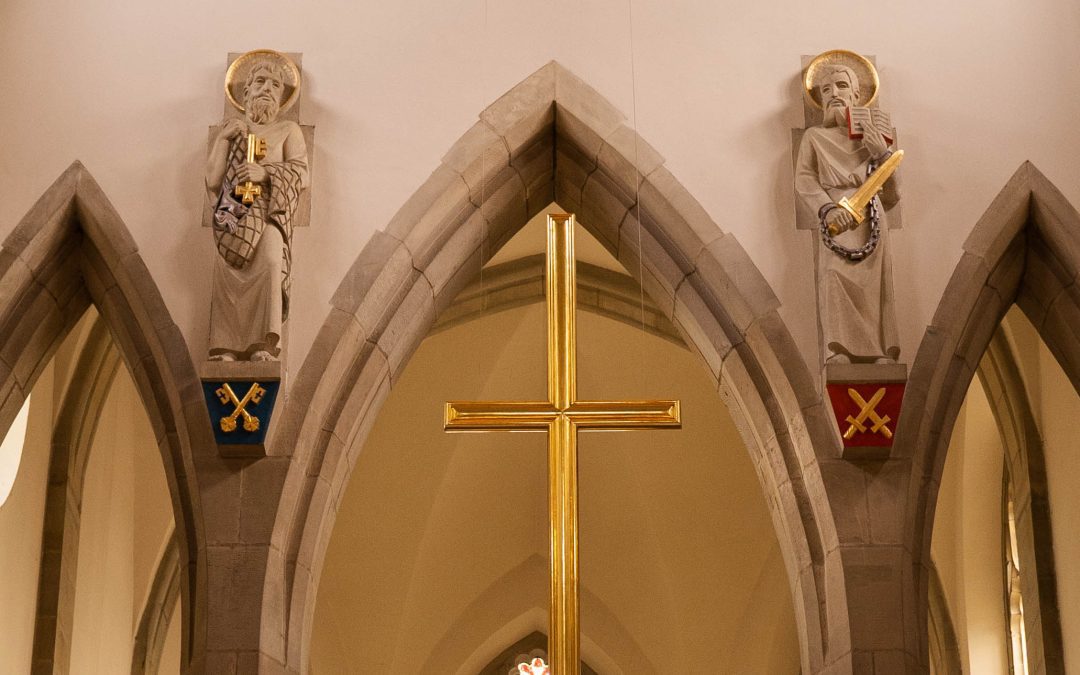The 29th June is the annual Feast Day of St Peter. Bradford Cathedral – or, to give it its full title, The Cathedral Church of St Peter Bradford – will mark its Patronal Festival in memory of the Saint on the nearest Sunday – the 30th June 2024.
This year, as well as marking the Saints’ Day and its particular importance for this Cathedral Church, it is also an important anniversary for two of our clergy team.
The Revd Canon Professor Dr Myra Shackley celebrates the 25th anniversary of her ordination, in Southwell Minster, and the Revd Canon Rod Anderson celebrates the 50th anniversary of his ordination to the priesthood, which took place in Bradford Cathedral.
Ahead of this weekend’s service, we spoke to them both to ask them about their memories of their ordinations.
The Revd Canon Professor Dr Myra Shackley
Canon Myra Shackley was ordained back in Petertide 1999.
“Ordination began a new phase in my life, but I was surprised that I’d arrived there.
“At the time I was employed at Nottingham Business School and I was going into self-supporting ministry, to be run alongside my full-time day job.”
Canon Myra will be preaching the sermon at the service, and it will reflect both her anniversary and the reading.
“It’s the reading for St. Peter where he’s sleeping between soldiers and an angel comes down.
“It says that a light shone in the cell and Peter goes out and becomes free. In many ways, ordination for me, was also a freeing up. For me ordination is a light shining, and I go out and become free, and that will be the foundation of my sermon.
“For me, rather than ordination being a burden, it was an actual freeing.”
The Revd Canon Rod Anderson

Canon Rod will be presiding over this year’s Patronal Festival. He was ordained here at Bradford Cathedral, exactly fifty years ago this Sunday on the 30th June 1974. You can read more about his reflections on his fifty years in the piece below.
Bradford Cathedral – Patronal Service
You can join us on Sunday 30th June to mark our Patronal Festival at our 8am and 10:30am services, with the latter streamed online via the Bradford Cathedral YouTube channel or Facebook page.
The Revd Pete Gunstone, Minor Canon for Worship and Nurture, says of the occasion:
“For those of us who are quicker to speak than think, rush in than plan, Peter is a comforting figure.
“Yet he is also an icon of God’s grace. The one who denied Jesus when the chips were down became the one to whom Jesus addressed the words: ‘You are Peter, and upon this rock I will build my church’.”
Canon Rod Anderson – Reflection on my first fifty years in the ministry
Ordained Deacon by Bishop Ross Hook MM, 1 July 1973 for Bradford Cathedral Curacy
As a physicist and a Kiwi I don’t easily fit into any C of E categories, except perhaps Square Peg. But when my ordaining bishop read my “Reflections on my First Year…” he said “I hope you retain this honesty” with the implication that there isn’t a lot of it about. A recently ordained speaker on Radio 4 said that her training vicar’s saying was “every ministry career ends in failure”. She disagreed with his own estimate of himself and of ministry generally. But it is possible to look around with puzzlement at the array of new posts and ministries in the church today and ask “Isn’t this what I’ve been trying to do for fifty years, though not with the same labels?”And it is possible to look at people close to us and think “Could I have done more?”
I mostly enjoyed parish ministry, even contact with what Bishop Geoffrey Paul described in his enthronement sermon as “the ragbag of saints and fatheads.” The people of the parishes including non-worshippers were and are in some fashion children of God. Once I was involved in the training of an ordinand who charitably thought I had an encyclopaedic knowledge of the parish, and as we walked round I made the unthinking statement that on this street I knew more ghosts than people. I would have been more orthodox to speak of the Communion of Saints. Much of parish ministry is concerned with people who move elsewhere or die so the priest’s relationship with them is for the moment passing. Workers with dementia sufferers talk of “the Sacrament of the present moment”. It doesn’t much help with the statistics, but it is in line with the parable of the sower and Jesus’ encouragement to the disciples that the fields would not always sprout according to the Strategy.
What have I as a bent scientist contributed to the church round the Broad Ford? Directly, all the number-crunching of deprivation statistics from the 1999 Census to produce figures from which parishes could apply for projects to be supported by the newly-established Church Urban Fund. And more diffuse, a tendency to always look a bit deeper than what the theologian and author Very Revd David Edwards in 1999 called “confident-sounding soundbites”. Fairly early in my ministry the Warden of Readers learned that I was interested in Church History (correct) and that I knew something about it (not necessarily so) and asked me to be a tutor for that year of Reader training. That was eighteen fascinating years, during which I learned much from the students, and they learned to dig inside the books and the ideas to see what other people thought and whether they agreed. It isn’t too threatening to do about someone else’s doctrine, and can perhaps lead to thinking about our Bible assumptions and realising that “not everyone thinks that way”. I can’t now claim to be an up to date physicist since I finished that phase of life before Quarks were thought of, but I try to keep up with discoveries and worry that the work of Professor David Wilkinson and his science team at Durham seem to have no significant effect on the church as a whole. There are people of all ages who have an understanding of science which they cannot reconcile with teaching from pulpits. Can’t we think again about what we are saying? David Edwards again, in a letter to the Church Times 25 June 1999 quoting Archbishop Michael Ramsey, “We state and commend the faith only in so far as we go out and put ourselves with loving sympathy inside the doubts of the doubters, the questions of the questioners, and the loneliness of those who have lost their way.” That process can lead to healthy questioning of our own faith.
In summary, I’ve been myself and used the abilities and training I’ve had over the years. Perhaps the last word for the moment can come from a previous congregation member (now also of the Communion of Saints) who came back from Scotland specially for my retirement service. Also a physicist by background, after a pause for thought he said to me “On reflection, I am glad to have known you”.
…and now fifty years as a priest
Priested by Bishop Ross Hook MM, 30 June 1974
Contrasts stand out when thinking of fifty years since priesting and 54 since starting theological college, with two years as a Reader before that. The fifty has been within Bradford, parish based and with various diocesan responsibilities accepted, various joys and sorrows, and occasional gladly accepted chances to twist the noses of Archdeacons. My way of doing things has always been to look immediately around me and see how I can help improve it, whether as a child, youngster, physicist or cleric. The flip side of that is a certain limpet-like tendency which could be accused of lack of ambition. As an example of my mindset, I once caused an FRS to choke on his soup. I told Rev Prof John Polkinghorne that I read “Heating and Plumbing Monthly” for pleasure.
There is a positive aspect to limpeting. While at the cathedral I gladly followed a trend and married one of the congregation. Pat and I are near our 49th anniversary, three children, four grandchildren.
Richard Holloway, multi-author and once Primus of Edinburgh, was a speaker at the very first Bradford Diocesan Clergy Conference and from him I first heard of Jeremy Taylor and what has been called “the Anglican three-legged stool” of Scripture, tradition and reason. Several of his books have come and gone and come on my bookshelves, and I’ve recently re-read his very moving autobiography “Leaving Alexandria”. He has an honesty about his doubts which he shared in his books and with his people, and which eventually led to him resigning but thankfully not to stopping writing. His pilgrimage leads me to wonder whether there isn’t enough organised support for the likes of Jeremy Taylor, Richard Holloway, and perhaps people like me in the face of the Certainty of others. Maybe our position is as thinly populated as the Via Media, which term I understand Cardinal Newman coined and decided that it didn’t exist.
Over 51 years of ordained ministry and a few years before that as Reader and as congregation member, I’ve known some wonderful people – some wonderful in special ways, some in their unique ordinariness. It’s an unmeasurable outcome how much the Kingdom of God has been advanced, and few of those people over the years would have stood up and shouted their faith in the public square. In the seven years I was Area Dean my Lay Chair was Gordon Moore, previously Chief Exec of Bradford Met and the archetype of the Town Clerk of Ephesus (Acts 19). At one Deanery meeting he and I got into an argument about whether it was worth pursuing outcomes which could not be measured. He said no, I said yes, and we left it after 90 seconds and a stunned Deanery. Now in retirement I regret that the Church seems to be running on targets . Resources must inevitably be placed with some measure of strategy now that money is tight, but local ministry and pastoral care sometimes seem a small part of the measure and clergy seem not to be recognised locally any more.
Fifty years of celebrating communion hasn’t become routine even though concentration slips occasionally. Once at an 8am service when the sacristan was ill, I got partway through the consecration prayer before I realised that I hadn’t put the bread and wine on the altar. The congregation knew me well enough to understand.
Over the last fifty years liturgy has changed. Many hate the semi-abandonment of Cranmer’s prose as slightly modified in 1662 and 1928. But the prose of Common Worship can also speak to the worshippers and doubters of today in their own words. In either form, I have been glad to be sharing the love and forgiveness of God with friends who need it, I need it myself as one of them and not an actor apart and above. Some don’t like laid down forms of words and make up their own. But a long time ago I was guest in a small local nonconformist church, where the service was free-form. On two successive Sundays the same people got up and said much the same thing at the same time. There is something to be said for a familiar form of service to which can be added the special words and thoughts for the occasion. And from time to time the words of the Liturgy have calmed me down in times of stress. I think that happens for the congregation too, as does “The body of our Lord Jesus Christ which was given for you, preserve your body and soul unto eternal life. Take and eat this in remembrance…” Note that the words (this is 1662) leave open both options of how we take Christ into our lives, hopes and needs from that service on.
So this ex-physicist can’t entirely measure what he has achieved for the Kingdom of God (oh, and that which was the Diocese of Bradford). But I can continue to hope and pray that my presence, and prayers, and presiding, have made some difference.

